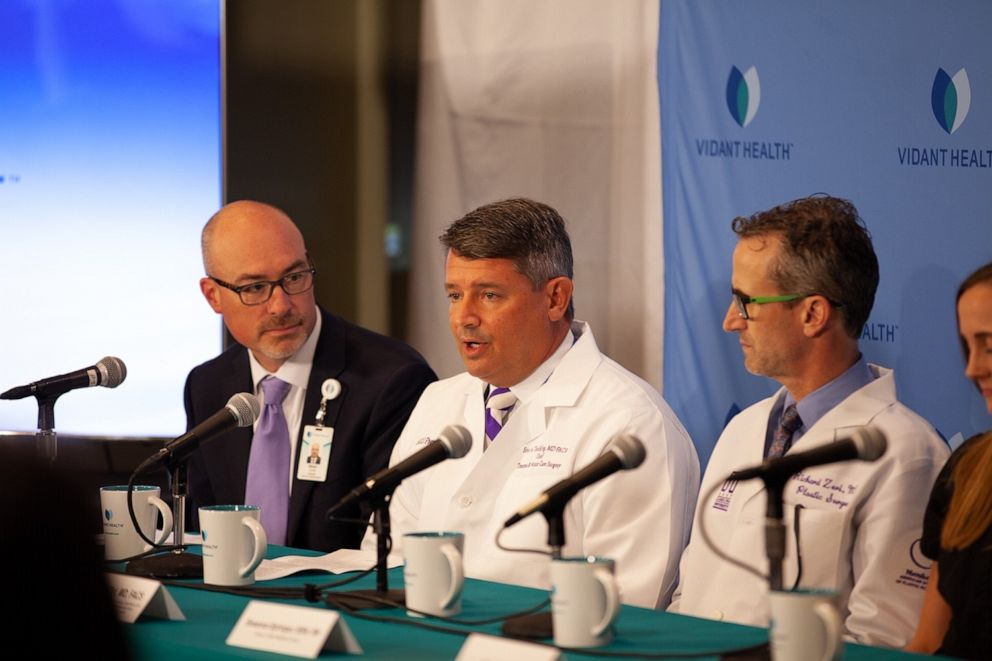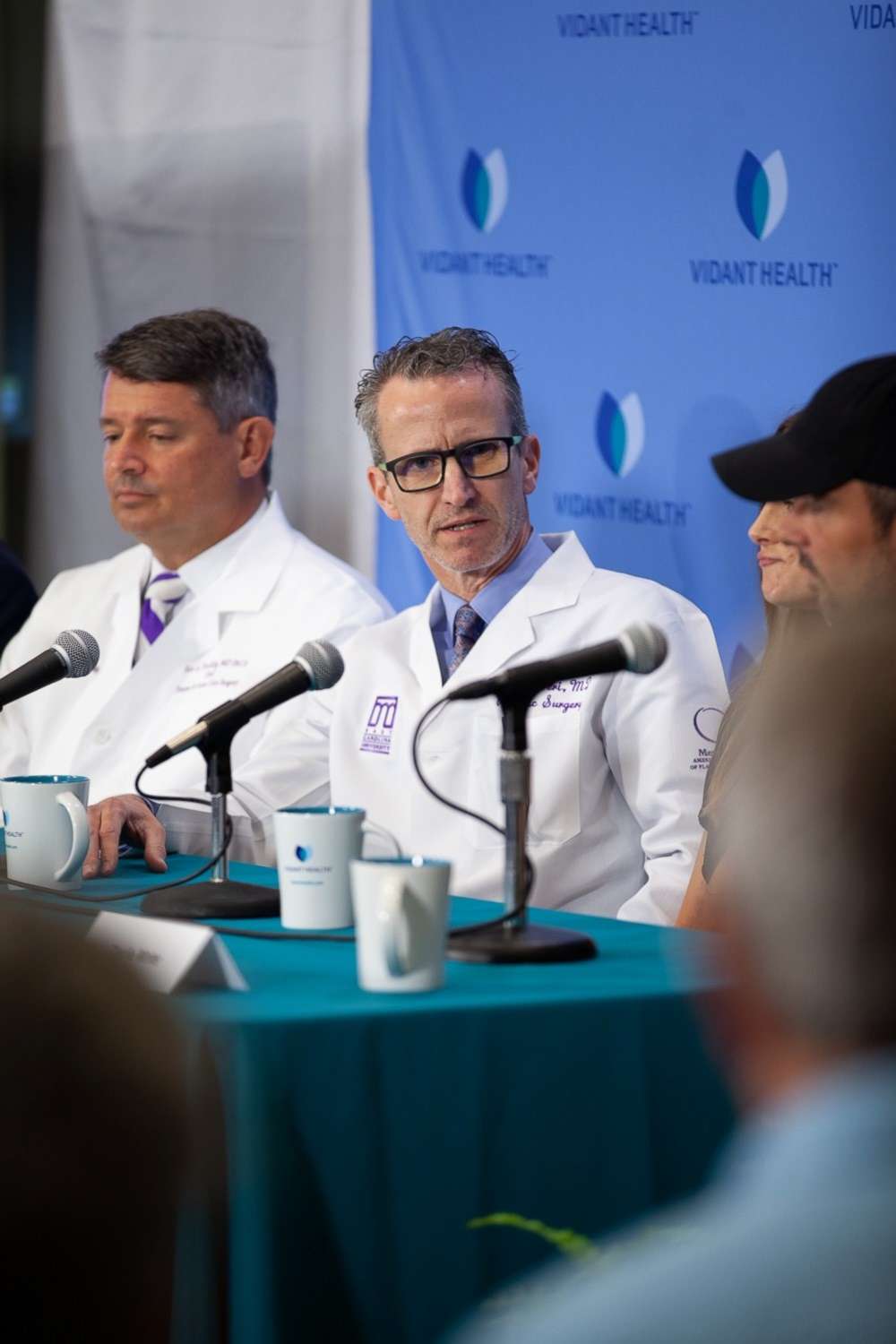Doctors weigh in on why teen surviving shark attack is more than a miracle
Paige Winter was attacked by a shark of the NC coast on June 2.
Paige Winter, 17, was rushed to the hospital after she was attacked by a shark in Atlantic Beach, North Carolina, on June 2. Her left leg was amputated at her thigh, and she lost two fingers.
Doctors who treated the teen at Vidant Medical Center describe how they assessed her injuries and why her positive outlook is so important to her recovery.
Love and Tourniquets: Dr. Eric Toschlog
On a picturesque afternoon at a pristine beach on the crystal coast of North Carolina, the life of a 17-year-old young woman was irrevocably changed. Paige Winter, standing with her siblings in waist-deep water, was attacked by a shark. The devastating injury to her left leg, which included severing of the major artery and vein supplying the leg, would likely take her life. But in the ensuing minutes, Paige received the heroism of love and a simple tourniquet.
Her father witnessed the attack, watching his daughter disappear beneath the surface in a swirl of bloody water. He dove into the water, found her, took her into his arms and lifted her out of the water. Still attached to her left leg was what he described as a "very big" shark. He proceeded to pummel the shark with his fists until it let go and then struggled to the beach with Paige in his arms, telling her that he loved her, bearing witness to the damage to her leg but unaware of the shark following close behind. On the beach, a bystander applied a tourniquet to her left thigh.
She was transported by Vidant EastCare air ambulance, during which a medical team assured proper tourniquet placement and began transfusing blood and plasma. Upon arrival to Vidant Medical Center, she was in hemorrhagic shock, yet alert, conversant and courageous. The trauma team activated the massive transfusion protocol and surveyed the damage.
I have seen dozens of mangled extremities in my career, but this injury, suffered by a 17-year-old simply having a beach day with her family, was heartbreaking. It never gets easier. The decision to amputate is never easy, but tragically there was no decision to be made. She underwent massive blood product resuscitation and amputation of her left leg at mid-thigh.
Simultaneously, our plastic surgeons began work on her hands. In subsequent days, Paige underwent multiple additional surgeries on her hands and has done extraordinarily well. She will be discharged to rehabilitation within the next week.

The worldwide death toll from shark attacks has been on the decline for decades. Reported fatalities secondary to unprovoked attacks now average six per year. There were only four unprovoked shark attack fatalities in 2018. This fact is most assuredly a testament to the evolution of trauma systems and care.
Paige's life was saved by the embedded education of a trauma system, Dr. Lenworth Jacobs and a loving father. A major recent advance in trauma care is the practice of "damage control" resuscitation. This practice hinges on the concept that exsanguinating hemorrhage requires immediate transfusion of blood products, to include not only red cells but also products that restore clotting, including plasma and platelets.
In addition, it is a new day in hemorrhage control in the United States. In response to the mass shooting at Sandy Hook Elementary School, the "Stop the Bleed" campaign was launched.
Under the leadership of a trauma surgeon, Dr. Lenworth Jacobs Jr., and the American College of Surgeons, a massive educational campaign has been undertaken. The focus of "Stop the Bleed" is to train non-medical personnel to stop life-threatening hemorrhage. Integral to the training is early application of tourniquets. Our trauma center has trained over a thousand citizens in our trauma system, distributing hundreds of tourniquets.
I relish listening to Paige's father speak of the "chain of life," because this chain of life is the trauma system. Paige is with us today because of an aeromedical system that includes immediate access to blood, an EastCare crew enacting damage control resuscitation and the dedicated providers at a Level I Trauma Center. I am very proud of our system, but the trauma system did absolutely nothing heroic, it simply performed as it is designed.
Paige Winter is an extraordinary young woman. I hear recurring words to describe her: courageous, forgiving and resilient. Caring for such a special person under tragic circumstances takes an incredibly emotional toll on nurses and doctors. But that toll has been lessened significantly by Paige's character. She has lifted and inspired those around her. She is an environmentalist and loves the ocean. In painful irony, she is a vocal advocate for preservation of the organism that nearly ended her life.
The real heroes in this story are a loving father and mother, a volunteer on a beach and a truly amazing young woman. Paige was saved by a simple piece of any trauma system, a tourniquet. But in reality, she was saved by something vastly more powerful. Love prompts extraordinary action. In the blood and duress of trauma surgery, I am witness to this every day.
Paige is alive as a result of one of the strongest forces that I have encountered in 20 years as a trauma surgeon, surpassing any medical technology. She was saved by love, the love of a father for his daughter.
Dr. Eric Toschlog, chief of Trauma and Acute Care Surgery, Vidant Medical Center; professor of Surgery, Brody School of Medicine at East Carolina University
Mind over Body: Dr. Richard Zeri
We often hear the saying, "What does not kill you makes you stronger." The truth goes beyond that statement.
Every adverse event in each of our lives has the potential to make us stronger or beat us down. We all deal with adversity differently, some with a positive attitude, some with a more dim outlook. The difference between lingering after injury and recovering to lead a fruitful, productive life is a positive outlook. Any medical practitioner can attest to the fact that those patients who maintain a positive attitude and are proactive in their recovery do best and recover more rapidly.
Paige is without doubt in this category.
It is not uncommon for children and younger patients in general to cope better with injury. I treated a young girl about eight years ago for a severe leg injury after having been bitten by a shark. "Little Lucy" was amazingly upbeat as well in her approach to getting better, despite being 6 years old at the time.
Paige is 17 years old and as such, I expected a typical teenager's response, including angst and some despair. Not so. She has, from day one, maintained an amazingly positive attitude. In the two weeks that I have cared for her since her injury, I have not heard a negative word come from her lips. I have not heard her complain once, seen her frown or shown anger, fear or sadness.
Just looking at her is uplifting; from her light blue hair, which she colored just days before her injury, to the tie-dye t-shirts she wears and the slightly restrained and ever present smile on her face, you can't help but wonder, "Where does all this strength and positive vibe come from?"

She has suffered devastating injuries that would emotionally drain any one of us. She has lost her left leg above her knee; she has suffered functionally life-changing injuries to both her hands, has lost two of the fingers on her left hand and most of the soft tissue of her hand in addition to trauma to the bones, arteries, tendons and nerves on both hands. Reconstruction of her hands has required three operations, two of which required complex microsurgical reconstruction.
Counterintuitively, the loss of her leg is the least of her injuries long-term. Not to minimize any of her injuries, however, with our knowledge of modern prosthetics and rehabilitation, much of which we have gained from our experience in treating our wounded soldiers in the conflicts of the last few decades, she will be fitted and be walking again in a matter of weeks. Recovery from her hand injuries will take much longer, including months and months of therapy and hard work, and possibly more operations depending on the outcome. And the psychological toll will be immeasurable.
A long road to recovery lies ahead of Paige. Her loving family and her dad, who, with the instinctive reaction of a first responder, wrapped his hand around her thigh to save her life as she was bleeding in the first few minutes after her injury, will play a huge role in her recovery, helping her emotionally through the psychological impact of the event.
However, Paige herself, I know, will play the biggest role. Her gregarious attitude, her love for all life on earth, her smile in the face of adversity, her ability to joke about everything having to do with sharks, will propel her through the next few months and onto the next wonderful chapters in her life.
I find it befitting and smile myself at the fact that her favorite character is indeed Iron Man; one who after adversity rose up, recovered, rebuilt and worked to make the world a better place. Where does Paige get all this strength and positive vibe? I would like to think that we all have it within us, but Paige manages to corral it, bring it to the surface and let her mind take over in a unique, wonderfully uplifting manner.
Dr. Richard Zeri, chief of the Division of Plastic and Reconstructive Surgery, Vidant Medical Center; associate professor and chief, Plastic and Reconstructive Surgery, Brody School of Medicine at East Carolina University.



